

Taylor Horne
Data privacy: How young people are fighting the tech giants. Senior Planet is a coworking space for seniors. Enter the Era of 'Entrepreneur-nity Leave' How Technology Could Revolutionize Refugee Resettlement. PITTSBURGH—Half a world away from the refugee camp in Uganda where he lived for a dozen years, Baudjo Njabu tells me about his first winter in the United States.
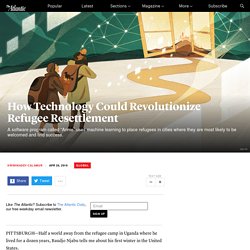
Floating Cities: United Nations Unveils Bold Idea to Fight Climate Change. Water-based cities could help humanity adapt to a changing climate with a sustainable approach to development, a United Nations roundtable claimed Thursday.

The event, which called for further investigation of the idea, also unveiled a concept vision for how these cities may look in the future. “Floating cities are a means of ensuring climate resilience, as buildings can rise along with the sea,” UN Deputy Secretary-General Amina Mohammed said at a roundtable on floating cities in New York. Deadly “Super Fungus” Could Be the Beginning of a Global Epidemic. Antifungal Resistance Bacteria’s ability to develop antibiotic resistance is well known — but it turns out fungi are also evolving to withstand modern medicine. Now one such fungus is cropping up in hospitals all across the globe and killing half the people who contract it within 90 days, according to an alarming story by The New York Times — raising concerns about a new global epidemic.
Global Threat Candida auris (C. auris) can infect anyone, but people with compromised immune systems, such as the elderly, are most likely to succumb to the fungus. Doctors only just discovered C. auris a decade ago in Japan. Data Can Help Students Maximize Return on Their College Investment. Doctor's office "phone booth" offers diagnoses and dispenses medication on the spot. Soft skills training preps young adults with autism for work. Share this Article You are free to share this article under the Attribution 4.0 International license.
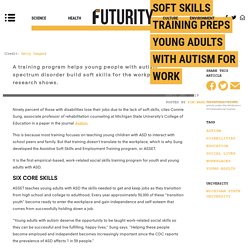
A training program helps young people with autism spectrum disorder build soft skills for the workplace, research shows. Ninety percent of those with disabilities lose their jobs due to the lack of soft skills, cites Connie Sung, associate professor of rehabilitation counseling at Michigan State University’s College of Education in a paper in the journal Autism. This is because most training focuses on teaching young children with ASD to interact with school peers and family. But that training doesn’t translate to the workplace, which is why Sung developed the Assistive Soft Skills and Employment Training program, or ASSET. It is the first empirical-based, work-related social skills training program for youth and young adults with ASD. Six core skills ASSET teaches young adults with ASD the skills needed to get and keep jobs as they transition from high school and college to adulthood. Tracking Readers’ Eye Movements Can Help Computers Learn.
Future - Can the legacy of trauma be passed down the generations? In 1864, nearing the end of the US Civil War, conditions in the Confederate prisoner of war camps were at their worst.
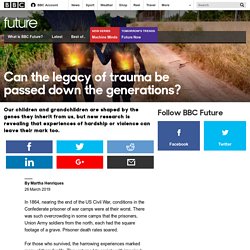
There was such overcrowding in some camps that the prisoners, Union Army soldiers from the north, each had the square footage of a grave. Prisoner death rates soared. Have young people stopped believing in democracy? – RSA Journal. By Marie Le Conte @youngvulgarian Over the past few years there have been a number of negative or, at best, divisive events in European politics.
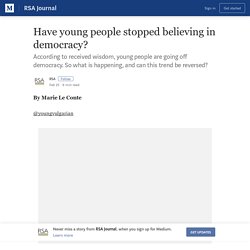
The EU struggled to respond as a bloc to the migrant crisis that started in 2015; Euroscepticism rose in prominence while populism and the far-right gained support across the continent. Another concerning dynamic — not unique to Europe — has been young people’s growing lack of faith in democracy. China shows off its first official neurosurgery robot – Fanatical Futurist by International Keynote Speaker Matthew Griffin. Matthew Griffin, described as “The Adviser behind the Advisers” and a “Young Kurzweil,” is the founder and CEO of the 311 Institute, a global futures think tank working between the dates of 2020 to 2070, and is an award winning futurist, and author of “Codex of the Future.”

Regularly featured in the global media, including AP, BBC, CNBC, Discovery, RT, and Viacom, Matthew’s ability to identify, track, and explain the impacts of hundreds of revolutionary emerging technologies on global culture, industry and society, is unparalleled. Recognised for the past six years as one of the world’s foremost futurists, innovation and strategy experts Matthew is an international speaker who helps governments, investors, multi-nationals and regulators around the world envision, build and lead an inclusive, sustainable future. Digital billboards in Stockholm project positive artworks to cheer up anxious commuters. Clear Channel and design studio Affairs have created The Emotional Art Gallery which uses the real-time emotions of commuters to replace adverts with artworks.
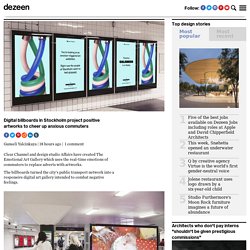
The billboards turned the city's public transport network into a responsive digital art gallery intended to combat negative feelings. A bespoke algorithm reacted to real-time public data gathered from Google searches, news articles, social media and travel traffic information to assess whether people in the Swedish capital felt sad, anxious, tired, stressed, irritated or afraid. Denialism: what drives people to reject the truth. We are all in denial, some of the time at least.

Part of being human, and living in a society with other humans, is finding clever ways to express – and conceal – our feelings. From the most sophisticated diplomatic language to the baldest lie, humans find ways to deceive. Deceptions are not necessarily malign; at some level they are vital if humans are to live together with civility. As Richard Sennett has argued: “In practising social civility, you keep silent about things you know clearly but which you should not and do not say.” Just as we can suppress some aspects of ourselves in our self-presentation to others, so we can do the same to ourselves in acknowledging or not acknowledging what we desire. Denialism, with Caroline Lucas MP & Keith Kahn-Harris. UPS eyes in-home health services with U.S. vaccine project. Is Cargotecture the future? The pros & cons of using shipping containers in construction. As the construction industry continues to evolve and adapt to innovations like green buildings, the push for more sustainable materials and the efforts to reduce waste, there is one trend that is pushing the limits of design — cargotecture.

Steel shipping containers have been a key component of global trade for the past 50 years, and now these steel boxes that are 8 feet wide by 8-and-a-half feet high — and either 20 or 40 feet long — are becoming a recycled building material that you can use to build your own home. Amsterdam Says Newly Built Homes Aren't for Renting Out.
People’s online photos are being used without consent to train face recognition AI. Photos of people’s faces are routinely taken from websites to help develop face recognition algorithms, without the subjects’ consent, a report by NBC reveals.
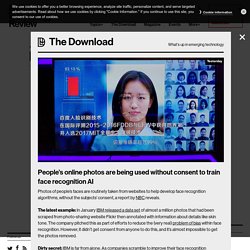
The latest example: In January IBM released a data set of almost a million photos that had been scraped from photo-sharing website Flickr then annotated with information about details like skin tone. The company pitched this as part of efforts to reduce the (very real) problem of bias within face recognition. However, it didn’t get consent from anyone to do this, and it’s almost impossible to get the photos removed. Dirty secret: IBM is far from alone. As companies scramble to improve their face recognition technology, they need access to vast numbers of images to feed their algorithms. The Internet Knows You Better Than Your Spouse Does. There’s More Bad News Than You Think. Between the 24-hour news cycle, the internet, and the smartphone the world has never been so saturated with information. Yet a new report by CARE International finds that humanitarian crises affecting millions of people around the world snagged relatively few headlines last year.
The report, “Suffering in Silence,” also found that climate change played a direct role in at least five of the 10 most underreported humanitarian crises of 2018, from chronic droughts in Ethiopia to Typhoon Mangkhut in the Philippines. The tally underscores how the developing world, which has less historical responsibility for the emissions that cause climate change, is feeling its effects earliest and hardest. In Madagascar, which the report describes as being at the front line of climate change, drought and unfavorable weather conditions have withered crops, while food prices hover close to record highs. Smartphone psychiatry: how doctors are harnessing tech to fight depression, anxiety.
While some may blame the rise of smartphones and other connected devices for an uptick in mental health conditions such as anxiety and depression, a growing number of researchers are seeking to harness such technology to help spot when vulnerable people are slipping into darkened moods that could threaten their wellbeing -- and even their lives. Known as digital psychiatry, such efforts are seen as being on the vanguard of mental health research. Scientists at the Toronto-based Centre for Addiction and Mental Health (CAMH), for example, are currently developing a Fitbit-like wristband as a tool to help young adults fight depression. The electronic device measures physical activity and sleep habits while a companion mobile app tracks social engagement and prompts users to complete an “electronic diary” about their mood, health, routines and daily life events in order to document changes in their overall wellbeing.
Dr. The quest to reclaim our data - Sifted. Before it became synonymous with Brexit, “take back control” was the catchphrase of London-based privacy startup Citizen Me. The company allows users to collect their own personal data on an app, either by connecting it to their social media accounts or by completing surveys. Businesses can then pay users directly for this (pseudonymised) data. Users are not getting rich: the global average remuneration is around £5 a month. China Banned 23 Million People From Traveling Last Year for Poor 'Social Credit' Scores. Can talking to robots combat a growing mental health crisis? Machine learning is contributing to a “reproducibility crisis” within science. Scientific discoveries made using machine learning cannot be automatically trusted, a statistician from Rice University has warned. A growing trend: Machine-learning systems are increasingly used by scientists across many disciplines to help refine and speed up data analysis.
What Cities Get When They Offer Free Tech Support to Residents. Would you be happy to see your doctor online? This mini-neighborhood for the homeless could be built in 90 days. Are Cyborg Warriors a Good Idea? Create Digital Humans in minutes, Soul Machines unveils Digital DNA platform – Fanatical Futurist by International Keynote Speaker Matthew Griffin. Even Amazon says it wants face recognition to be regulated. Amazon, a leading purveyor of face recognition software, has backed calls for technology to be regulated. Carers quitting jobs from pressure. Woebot, the World's first AI counsellor, manages 2 million conversations a week – Fanatical Futurist by International Keynote Speaker Matthew Griffin. WHY THIS MATTERS IN BRIEFMental health issues seem to plague modern society, but the number of people who seek out professional help is minimal, so companies are developing AI counsellors that are free and accessible anywhere 24/7.
The amazing homes that build themselves - BBC Reel. Why some Japanese pensioners want to go to jail. Airbnb will pay for you to live in Italy for three months. Tokyo Metro is offering free soba to flexible commuters. Brightest App Makes Volunteering Easier. The Streets Will Never Be the Same: The Future of Car-Free Roads. Wellcome Trust's four day week is great for gender equality — Quartz at Work. Federally Funded Companions Keep Seniors Connected To Their Neighbors. The Chicago Coffeehouse That Offers a Shot of Psychology. Finland’s grand AI experiment. Denmark embarks on ambitious plan to create new islands off Copenhagen coast.
Social Balconies connects existing balconies to encourage social interaction. Firm Led by Google Veterans Uses A.I. to ‘Nudge’ Workers Toward Happiness. India’s co-living sector will be worth over $2 billion by 2022. How soon will climate change force you to move? This pretax benefits startup is giving hourly workers a raise. How Estonia’s paperless e-government serves as a model for the world. The Man Who Married a Hologram: Rise of Digisexuals. Estonia goes digital to end bureaucracy. Vermont offers $10,000 if you move there and work remotely. Inside the Restaurant of Mistaken Orders. Want Yellow Peas? New-Age Traders Are Seeking You Out. U.S. Farmers Wary of ‘Ulterior Motive’ for Traders’ Digital Push. Sweden’s Push to Get Rid of Cash Has Some Saying, ‘Not So Fast’ The Sand-Sucking Ships That Reshape the World. At least 15 central banks are serious about getting into digital currency. Friends With Secrets lets people read chat transcripts from therapy se.
Is a four-day week the future of work? MIT Engineer Caleb Harper Explains Why “Diabetes Basil” Is the Future of Food. How Virtual Reality Can Transform Who You Are. Soon your doctor will be able to wirelessly track your health—even through walls. WEDEW turns air into drinking water by creating artificial clouds in shipping container. UberEats is using data to create cool, non-existent restaurants. Robotic indoor farms can grow food anywhere, anytime. Your brain waves could soon replace passwords entirely.